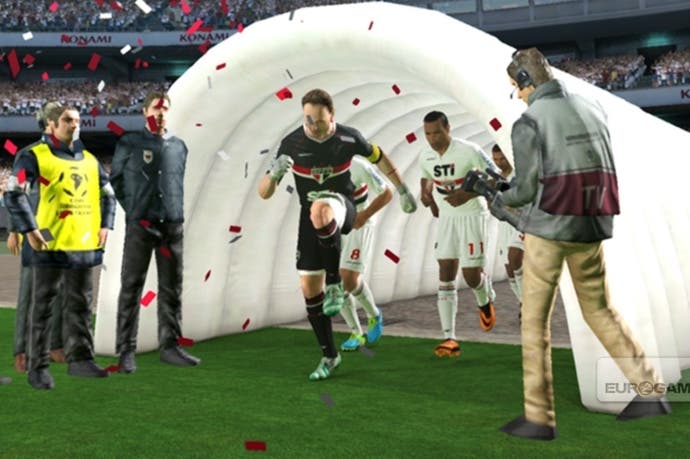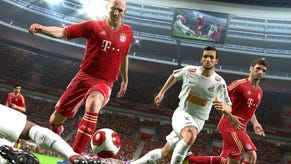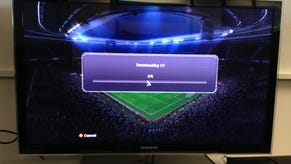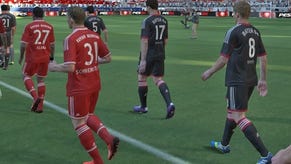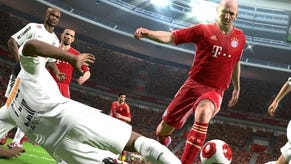PES 2014 preview: Why I'll be making the switch back this year
How the move to the Fox Engine ushers in Konami's boldest update yet.
Leafing through adverts and reviews of football games going back 10 or 20 years, it's immediately noticeable how little has changed - superficially - in the way we describe them. The box blurb for FIFA 95, for example, boasts of its "fast gameplay" and "pinpoint give-and-go passes". Both phrases that will likely feature in any discussion of its descendant in 2013. This rather charming 1997 IGN review of ISS 64, meanwhile, speaks glowingly of the title's "responsiveness" while asserting that there's "no lag time like in FIFA". Sound familiar?
The significance of this is that, while the genre has moved forward - impossibly, unimaginably so when I think back to my sheer astonishment the first time I laid my eyes on FIFA 97 - we're all still striving for the same things. Not a better representation of the sport we love, perhaps, but a better synthesis of all the things we've enjoyed from the dozens of iterations played over the years. Capturing this only gets harder as time goes on, and a 'perfect game', as we might imagine it, moves further and further away. It's a Herculean task for developers, and you can't help but feel a little sympathy for them having to step up to the plate, year after year, and take another swing
It's about time someone threw a curveball.
Allow me to preface my brief playthrough experience of PES 2014 with an admission. I'm a FIFA guy. Like (almost) everyone else, I jumped ship in the late noughties and - despite still playing with PES controls - have barely looked back. The apparent reinvention of the PES series over the last few years piqued my interest of course, but nothing more than that. FIFA's been fine, just fine - even excellent at times - and the licences, online play and sheer glut of gameplay options means I've rarely regretted my choice.
"Within 30 seconds of playing PES 2014 I knew, fairly instinctively, that this is the year that my allegiances switch back again."
The thing is, FIFA's big comfort blanket quickly lulls you into forgetting what it is that's important about these games. It's not the training system, the online infrastructure or the bloke on the box. It doesn't matter if the team you support's left-back tweets about it (Jose Enrique is a big fan, it seems). It's the pleasure you get from the simple elements of the game - the passing, the shooting, the dribbling - that's all that really matters. Or at least it should be.
I'll try not to fall into the trap of talking in vague terms about "gameplay" and "fluidity" and will begin as simply as I possibly can. Within 30 seconds of playing PES 2014 I knew, fairly instinctively, that this is the year that my allegiances switch back again.
It's the sharpness and rhythm of the passing, the weight of the players as they receive and turn with the ball. It's the balance, that impossible-to-articulate synchronicity between the game's most fundamental aspects that just somehow 'clicks', and immediately draws you in. Despite playing for about two hours, I could happily have sat for two or three times that length trying to build up attacks and find new ways to score.
This, I think, is PES's masterstroke. It's not simply added feature upon feature to its existing, bloated engine. It's started from scratch, ignored the allure of novelty features and said: "How can we make the four or five key elements of a football match as good as they possibly can be?" I was playing code described to me as 60 per cent finished, so there's plenty of time for Konami to drop the ball, but what struck me was just how 'right' everything felt - a 'rightness' informed as much by playing football games as it has been by watching the real thing, but one that most gamers will instantly recognise, nevertheless.
How much of its success is down to the much-trumped Fox Engine? It's hard to say. The claim is that, rather than using pre-scripted animations, PES 2014 is the first game of its kind to have the ball and player move independently of each other, as separate, animated entities, and thus interact with much more complexity and sophistication. Konami lay out six key tenets which underline their use of the engine (including the utterly unsexy-sounding "barycentric physics"), but these are all different version of things we've heard before. What's important here are that the basics feel spot-on and, after so many years of PES not quite getting there - you have to assume Fox has played it's part.
Is it more realistic than FIFA, or previous versions? No. But I don't think realism is what matters here - people didn't love PES 5 and 6 because they were especially realistic. It's faster, it's slicker - it's simply more enjoyable. And it's not lacking in depth, either.
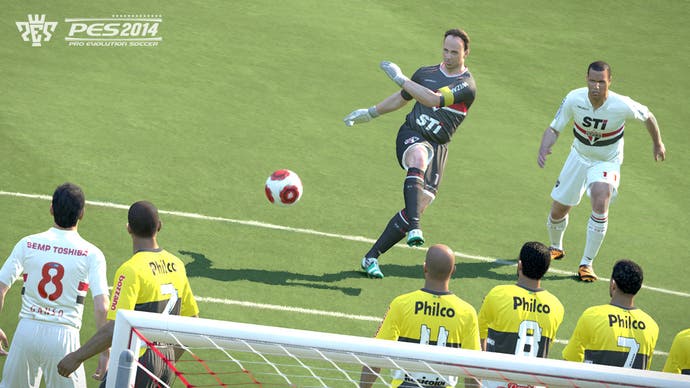
"Combination play" allows users to set up pre-defined attacking moves to unleash in-game, much like we've seen with set-pieces in the past, and the possibilities here are almost limitless, from overlapping right-backs to decoy runs by inside forwards. Individual tricks and dribbling, meanwhile, feel a great deal more intuitive than in previous versions - and offer clear rewards for gamers willing to invest the hours to learn when such moves should be deployed.
Capturing team's personalities, as it were, through advances in AI, is another huge accomplishment - never before have I played a football game and felt that, even if both teams were wearing blank kit, I could tell it was Bayern Munich, say, that I was playing against, just from the way they were playing. I foolishly chose Santos in my first game with the preview code and found, just like in real life, the team was too reliant on Neymar, and that unless I found a way to create some space for him, I didn't stand much of a chance.
Being forced to think like this, just as real-life football players (and managers) do, is something I've seen talked about before in both series, but never has it been realised to this extent.
Added to this is an expanded set of bespoke animations and AI for individual players, with about 100 (up from 50 last year) of the game's biggest stars getting the "Player ID" treatment. It's a counterintuitive claim, but despite the lack of official licenses, this PES feels more like playing with the teams and players you know and love than its counterpart - and it's not like online option files are particularly hard to find if the thought of playing as North Lancashire turns your stomach.
So, feel free to take with a pinch of salt the opinion of someone that works in an industry where contrariansim is heavily incentivised, but at this admittedly early stage PES looks to be, aside from all the whistles and baubles, a purer, more refined expression of the sport, at its simplest, than its moneyed rival. We've become adept at describing what's good about football games each year - perhaps it's about time we remembered what made them fun in the first place.
